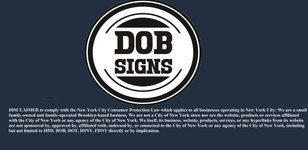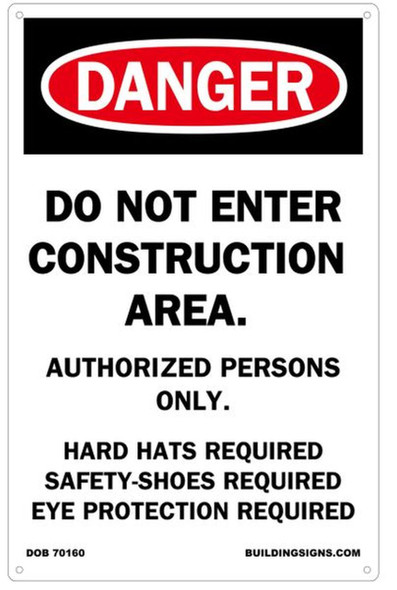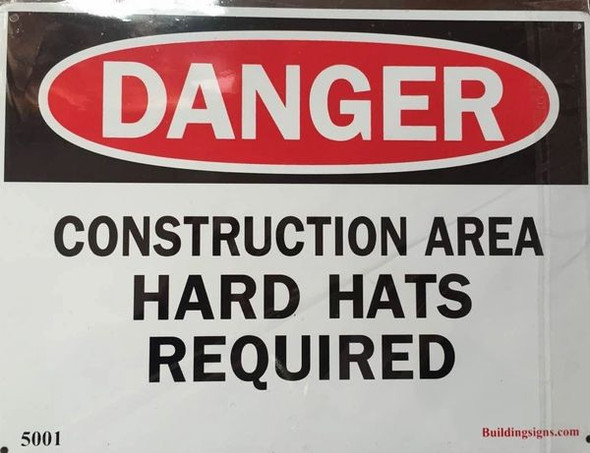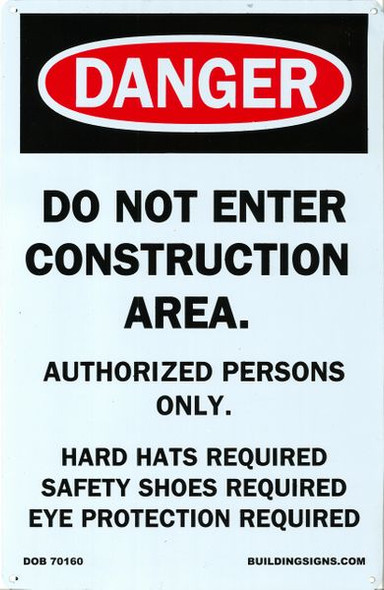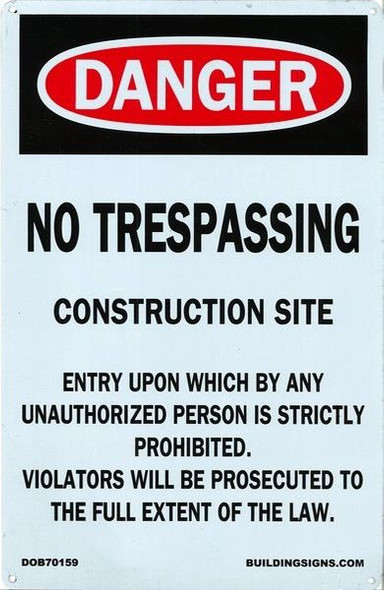DOB SIGNS
DANGER: CONSTRUCTION AREA HARD HATS REQUIRED SIGN (ALUMINUM SIGNS 12X9)
- MPN:
- PPE Sign - Site Safety Rules Sign
- Availability:
- DO NOT ENTER CONSTRUCTION AREA - AUTHORIZED PERSONS ONLY
Description
DANGER: CONSTRUCTION AREA HARD HATS REQUIRED SIGN
Size: 12X9 inch
Sign has mounting holes in each corner.
Sign Thickness 0.02''
Sign material: Aluminium
Protect Yourself
Construction
Personal Protective
Equipment (PPE)
Eye and Face Protection
- Safety glasses or face shields are worn any time work operations can cause foreign objects to get in the eye. For example, during welding, cutting, grinding, nailing (or when working with concrete and/or harmful chemicals or when exposed to flying particles). Wear when exposed to any electrical hazards, including working on energized electrical systems.
- Eye and face protectors – select based on anticipated hazards.
Foot Protection
- Construction workers should wear work shoes or boots with slip-resistant and puncture-resistant soles.
- Safety-toed footwear is worn to prevent crushed toes when working around heavy equipment or falling objects.
Hand Protection
- Gloves should fit snugly.
- Workers should wear the right gloves for the job (examples: heavy-duty rubber gloves for concrete work; welding gloves for welding; insulated gloves and sleeves when exposed to electrical hazards).
Head Protection
- Wear hard hats where there is a potential for objects falling from above, bumps to the head from fixed objects, or of accidental head contact with electrical hazards.
- Hard hats – routinely inspect them for dents, cracks or deterioration; replace after a heavy blow or electrical shock; maintain in good condition.
Hearing Protection
- Use earplugs/earmuffs in high noise work areas where chainsaws or heavy equipment are used; clean or replace earplugs regularly.
Frequently asked questions:
What are the full body protection PPE used at construction site? Personal Protective Equipment (PPE) for Construction
· Protective gloves.
· Hearing protection.
· Full face shields when cutting, grinding, or chipping.
· Chemical splash goggles.
· Respiratory protection.
· Fall protection equipment when working above 6 feet.
· Specific protective clothing such as welding leathers when welding or FR clothing when working with live electric.
What is PPE in safety? Personal protective equipment, commonly referred to as "PPE", is equipment worn to minimize exposure to hazards that cause serious workplace injuries and illnesses. These injuries and illnesses may result from contact with chemical, radiological, physical, electrical, mechanical, or other workplace hazards
What are the basic PPE? Personal protective equipment, commonly referred to as “PPE”, is equipment worn to minimize exposure to a variety of hazards. Examples of PPE include such items as gloves, foot and eye protection, protective hearing devices (earplugs, muffs) hard hats, respirators and full body suits.
What is the most commonly used PPE? Personal protective equipment, commonly referred to as “PPE”, is equipment worn to minimize exposure to a variety of hazards. Examples of PPE include such items as gloves, foot and eye protection, protective hearing devices (earplugs, muffs) hard hats, respirators and full body suits.
Protect Yourself
Construction
Personal Protective
Equipment (PPE)
Eye and Face Protection
- Safety glasses or face shields are worn any time work operations can cause foreign objects to get in the eye. For example, during welding, cutting, grinding, nailing (or when working with concrete and/or harmful chemicals or when exposed to flying particles). Wear when exposed to any electrical hazards, including working on energized electrical systems.
- Eye and face protectors – select based on anticipated hazards.
Foot Protection
- Construction workers should wear work shoes or boots with slip-resistant and puncture-resistant soles.
- Safety-toed footwear is worn to prevent crushed toes when working around heavy equipment or falling objects.
Hand Protection
- Gloves should fit snugly.
- Workers should wear the right gloves for the job (examples: heavy-duty rubber gloves for concrete work; welding gloves for welding; insulated gloves and sleeves when exposed to electrical hazards).
Head Protection
- Wear hard hats where there is a potential for objects falling from above, bumps to the head from fixed objects, or of accidental head contact with electrical hazards.
- Hard hats – routinely inspect them for dents, cracks or deterioration; replace after a heavy blow or electrical shock; maintain in good condition.
Hearing Protection
- Use earplugs/earmuffs in high noise work areas where chainsaws or heavy equipment are used; clean or replace earplugs regularly.
Frequently asked questions:
What are the full body protection PPE used at construction site? Personal Protective Equipment (PPE) for Construction
· Protective gloves.
· Hearing protection.
· Full face shields when cutting, grinding, or chipping.
· Chemical splash goggles.
· Respiratory protection.
· Fall protection equipment when working above 6 feet.
· Specific protective clothing such as welding leathers when welding or FR clothing when working with live electric.
What is PPE in safety? Personal protective equipment, commonly referred to as "PPE", is equipment worn to minimize exposure to hazards that cause serious workplace injuries and illnesses. These injuries and illnesses may result from contact with chemical, radiological, physical, electrical, mechanical, or other workplace hazards
What are the basic PPE? Personal protective equipment, commonly referred to as “PPE”, is equipment worn to minimize exposure to a variety of hazards. Examples of PPE include such items as gloves, foot and eye protection, protective hearing devices (earplugs, muffs) hard hats, respirators and full body suits.
What is the most commonly used PPE? Personal protective equipment, commonly referred to as “PPE”, is equipment worn to minimize exposure to a variety of hazards. Examples of PPE include such items as gloves, foot and eye protection, protective hearing devices (earplugs, muffs) hard hats, respirators and full body suits.
Personal protection equipment (PPE) sign- NYC DOB and many city state and municipalities required owner to install at the entrance to the site and in the site at visible locations signs that inform employee and contractures the “site safety rules”. The Personal Protective Equipment (PPE) includes all equipment (even those used to protect against adverse weather conditions) used to protect employees from health and safety risks they might encounter at work, including injuries to the lungs, head, eyes, ears and skin
Protect Yourself
Construction
Personal Protective
Equipment (PPE)
Eye and Face Protection
- Safety glasses or face shields are worn any time work operations can cause foreign objects to get in the eye. For example, during welding, cutting, grinding, nailing (or when working with concrete and/or harmful chemicals or when exposed to flying particles). Wear when exposed to any electrical hazards, including working on energized electrical systems.
- Eye and face protectors – select based on anticipated hazards.
Foot Protection
- Construction workers should wear work shoes or boots with slip-resistant and puncture-resistant soles.
- Safety-toed footwear is worn to prevent crushed toes when working around heavy equipment or falling objects.
Hand Protection
- Gloves should fit snugly.
- Workers should wear the right gloves for the job (examples: heavy-duty rubber gloves for concrete work; welding gloves for welding; insulated gloves and sleeves when exposed to electrical hazards).
Head Protection
- Wear hard hats where there is a potential for objects falling from above, bumps to the head from fixed objects, or of accidental head contact with electrical hazards.
- Hard hats – routinely inspect them for dents, cracks or deterioration; replace after a heavy blow or electrical shock; maintain in good condition.
Hearing Protection
- Use earplugs/earmuffs in high noise work areas where chainsaws or heavy equipment are used; clean or replace earplugs regularly.
Frequently asked questions:
What are the full body protection PPE used at construction site?Personal Protective Equipment (PPE) for Construction
- Protective gloves.
- Hearing protection.
- Full face shields when cutting, grinding, or chipping.
- Chemical splash goggles.
- Respiratory protection.
- Fall protection equipment when working above 6 feet.
- Specific protective clothing such as welding leathers when welding or FR clothing when working with live electric.
What is PPE in safety? Personal protective equipment, commonly referred to as "PPE", is equipment worn to minimize exposure to hazards that cause serious workplace injuries and illnesses. These injuries and illnesses may result from contact with chemical, radiological, physical, electrical, mechanical, or other workplace hazards
What are the basic PPE? Personal protective equipment, commonly referred to as “PPE”, is equipment worn to minimize exposure to a variety of hazards. Examples of PPE include such items as gloves, foot and eye protection, protective hearing devices (earplugs, muffs) hard hats, respirators and full body suits.
What is the most commonly used PPE? Personal protective equipment, commonly referred to as “PPE”, is equipment worn to minimize exposure to a variety of hazards. Examples of PPE include such items as gloves, foot and eye protection, protective hearing devices (earplugs, muffs) hard hats, respirators and full body suits.
Personal Protection equipment signs at construction site:
Personal Protective Equipment Signs. ANSI & OSHA Compliant Signs. ANSI / OSHA compliant Personal Protective Equipment Signs remind workers of what equipment should be used while handling materials or working in hazardous areas
Why DOB required PPE signs? Personal protective equipment (PPE), such as hard hats, ear protection, safety glasses, and work boots, are necessary to prevent injuries in many industries. Hence, mandatory PPE signs in various areas of your workplace are an important visual reminder of your company's safety policies.
When should PPE be used? All staff, patients and visitors should use PPE when Why PPE safety is important? PPE is equipment that will protect the user against health or safety risks at work. It can include items such as safety helmets, gloves, eye protection, high-visibility clothing, safety footwear and safety harnesses. It also includes respiratory protective equipment (RPE)
What is consider 3 type of PPE ? The different types of PPE include face shields, gloves, goggles and glasses, gowns, head covers, masks, respirators, and shoe covers. Face shields, gloves, goggles and glasses, gowns, head covers, and shoe covers protect against the transmission of germs through contact and droplet routes.
How does PPE protect? Personal protective equipment (PPE) is protective clothing, helmets, goggles, or other garments or equipment designed to protect the wearer's body from injury or infection. The hazards addressed by protective equipment include physical, electrical, heat, chemicals, biohazards, and airborne particulate matter
What PPE must be worn at all times ? This PPE Must Be Worn At All Times Sign uses informational messages for safety identification and PPE compliance. A PPE Must Be Worn At All Times Sign is a useful tool to help protect the health and safety of personnel, but is not a substitute for required protective measures for eliminating or reducing hazards
Shipping and Handling Cost:
Our Shipping is fixed whether you buy 1 item or 20 items (We Ship within USA Only) - do not miss this opportunity to buy all signs needed at no additional shipping cost.
Sales Tax:
We are required to collect sales tax on any product sold on this site and shipped to an address in New York. The sales tax is 8.875 percent.
DISCLAIMER to comply with the New York City Consumer Protection Law which applies to all businesses operating in New York City: We are small family-owned and family-operated Brooklyn-based business. We are not a City of New York store nor are the website, products or services affiliated with the City of New York or any agency of the City of New York. We ourselves, our business, websites, products, services, or any hyperlinks from its website are not sponsored by, approved by, affiliated with, endorsed by, or connected to the City of New York or any agency of the City of New York, including but not limited to HPD, DOB, DOT, DSNY, FDNY and federal directly or by implication.
DISCLAIMER These codes may not be the most recent version. The State / federal or other regulation department may have more current or accurate information. We make no warranties or guarantees about the accuracy, completeness, or adequacy of the information contained on this site or the information linked to on the state site. Please check official sources.
The requirements for sign content are determined by intended use and by applicable regulation. The BUYER is responsible for determining the appropriate content for a sign or package of signs. WE makes no warranty or representation of suitability of a sign for any specific application. IT IS THE CUSTOMER'S RESPONSIBILITY TO ENSURE THAT THE SIGNS THE CUSTOMER ORDERS ARE IN COMPLIANCE WITH ALL STATE, FEDERAL, LOCAL, AND MUNICIPAL LAWS. Please review terms and conditions prior to purchase.
For more information about what is required, see the laws that are referenced and the rules applicable to your city and state. This page is for informational purposes only and is not intended as legal advice, professional advice or a statement of law. You may wish to consult with an attorney.
